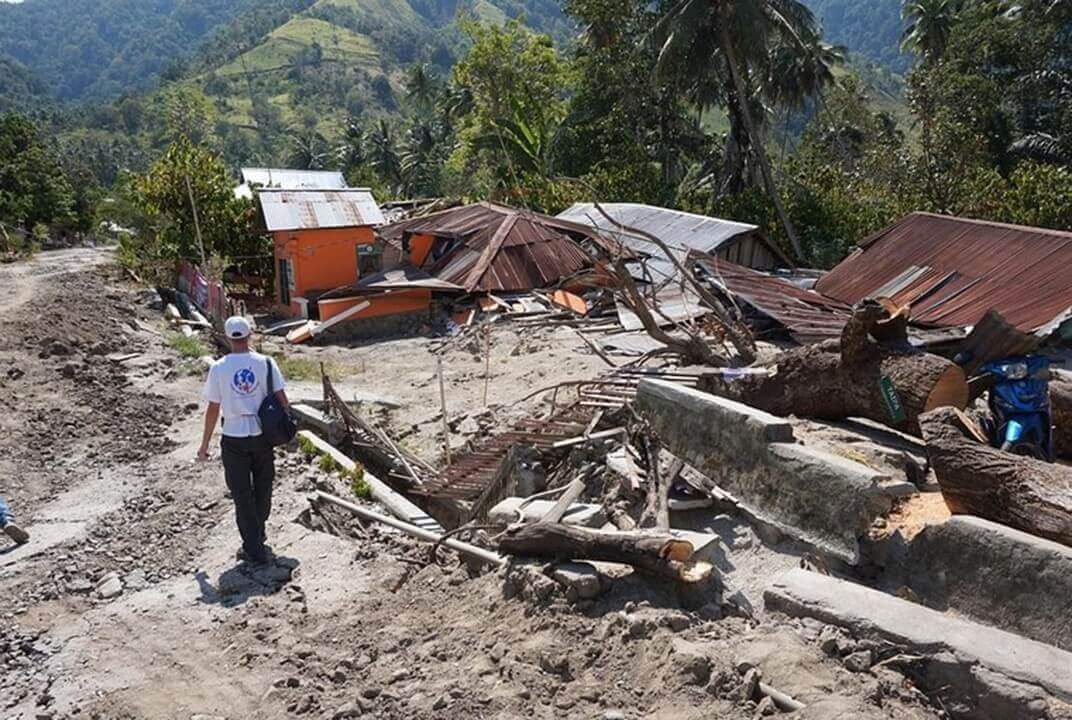Insight | Enlisting as a Greyshirt
Enlisting as a Greyshirt
Enterprise
Following Inmarsat's sponsorship of Team Rubicon UK, James Grisbrook explains how 32 new recruits were signed up as Greyshirts to pledge their support.
This blog’s title may suggest I’ve thrown in the towel on my corporate career and joined an obscure regiment of Her Majesty’s Armed Forces. So that I can assure you this is not the case, let me first explain what a Greyshirt is and what Team Rubicon does.
Team Rubicon unites the skills and experiences of military veterans with civilian first responders to rapidly deploy emergency response teams domestically and internationally. After a disaster, its people deploy to help those affected in the immediate aftermath, working alongside other NGOs during the response period when infrastructure is overwhelmed.
The volunteers who deploy on behalf of Team Rubicon are called Greyshirts. To get a grey shirt volunteers need to complete an initial two-day training session, like the one 32 new Inmarsat Greyshirts completed at a former RAF base in Wiltshire recently.
Making a difference
The brainchild of Inmarsat Enterprise President and ex-serviceman Paul Gudonis, the company has become the first UK business to embed Team Rubicon into a corporate initiative. Judging by the number of us who travelled down to Wiltshire for training, this new relationship has been embraced as an exciting opportunity. But why do it? I asked around and what kept on coming through from Inmarsat staff was they wanted to make a difference personally.
While I believe donating to charity is a worthy way to help, it doesn’t perhaps afford you a great deal of insight into what people are experiencing globally and I wanted to try to do something that helped people directly.
Considering how I could help, on the other hand, caused me some consternation. I don’t have many – in the words of Napoleon Dynamite – skills. The closest I’ve come to military service was an inglorious stint in the 14th Bromley Scout Group… But, as I soon found out, none of this was to matter.
Team Rubicon emphasises upskilling and self-selection. What this means is Greyshirts can choose areas where they want to develop their skills for use in the field. I’m not sure what this says about Inmarsat Greyshirts, but a lot of interest was expressed in developing chainsaw skills! Typically to get to the point of international deployment, several training sessions need to be completed. But front-line international deployment isn’t for everyone, so Greyshirts can self-select where they feel they want to work, be it in the Operations Centre in the UK, in fundraising or in a variety of other roles.
We certainly experienced an impressive taste of Team Rubicon’s ability to build capacity in our induction training. Over two days the excellent instructors divided us into six teams and ran us through a series of concise and informative talks covering topics like the UK resilience environment, how to use field tech and psychological first-aid.
First response preparedness
This was followed by a practical scenario to simulate a likely UK disaster situation in which a town had been flooded. In our teams we surveyed several buildings to gauge whether there were individuals inside and whether we could enter, radioing in our evaluations to the Operations Centre. We also practised throwing ropes to a (not really) drowning person in a (imaginary) swollen river – my technique could do with some improvement!
However, the importance of these practice scenarios were really put into context by some of the honest and open-hearted accounts from the field. Hearing about Ben “Bags” Simmons’ experience, waving goodbye to children on the beach in Haiti after rebuilding a school, was very moving and I think it brought home why a lot us wanted to get involved in the first place. This really typified the way the course was run. Throughout there was a friendly, open atmosphere, which meant it was a great opportunity for Inmarsat colleagues from different parts of the business to get to know each other better.
Next, we’ll provide an update on how Inmarsat Greyshirts are beginning to get involved in the organisation and on future deployments, but for now I would like to say a massive thank you to all at Team Rubicon for a brilliant course, and everyone at Inmarsat who made this a possibility.
About the author
James Grisbrook joined Inmarsat in 2017 as External Communications Manager for the Enterprise Business Unit. He specialises in building research programmes and has authored Inmarsat’s first global IoT research study: Enterprise IoT 2017.
A keen traveller, James recently returned from Rwanda where he has been helping develop awareness around Inmarsat’s Smart City Education Programme. In his spare time James likes to run and read.


